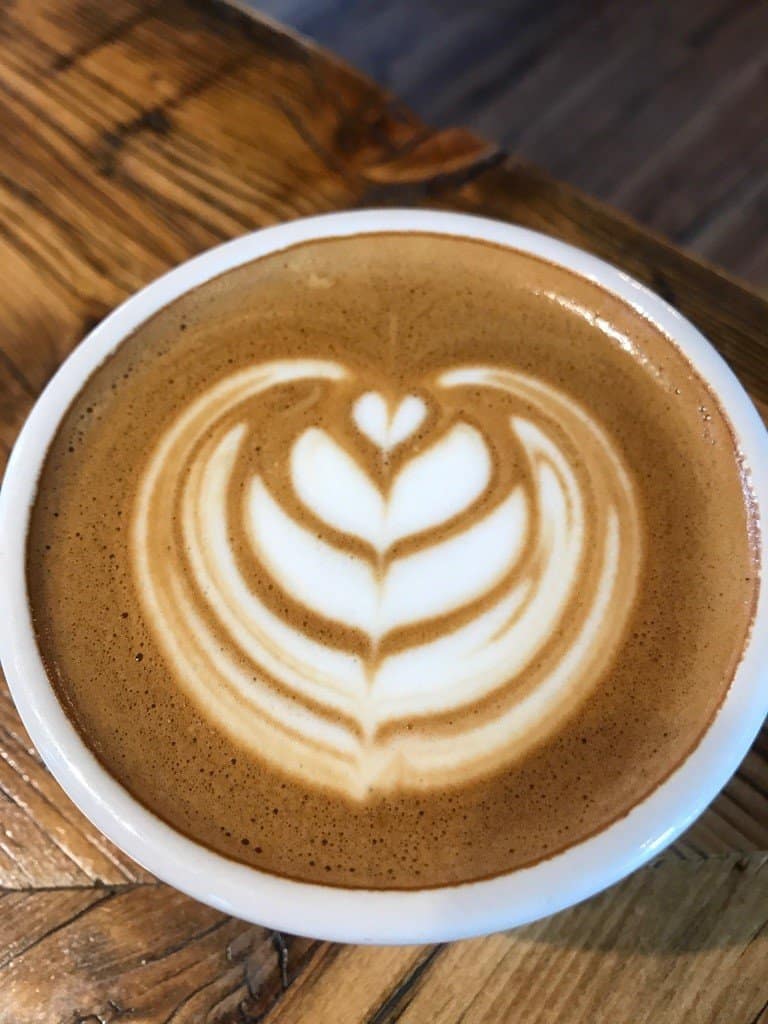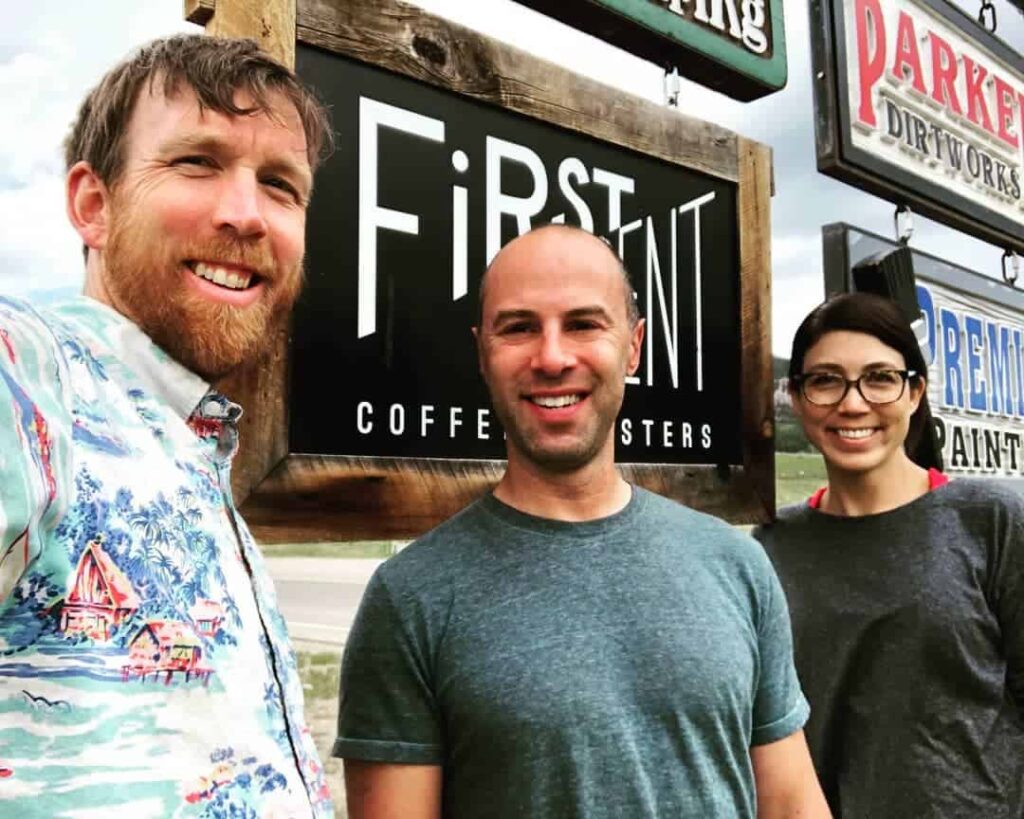
“It was in Boulder that I discovered what we would call specialty coffee,” says Sam Higby, the Owner of First Ascent Coffee Roasters. Back then, Higby was working for La Sportiva when he discovered Boxcar Coffee Roasters, which roasts all its own coffee in-house. “It was the first place I ever encountered where no matter who the barista was, I got an amazing drink.”
Higby had studied Digital Media in college, but quickly secured work after graduation in Breckenridge, buying and selling outdoor gear. Later, he went to Utah to work for Black Diamond Equipment, enjoying Salt Lake City’s ready access to outdoor opportunities, before coming back to Colorado and setting up camp in Boulder.
Higby had found joy in the sourcing and customer service elements of the outdoor gear world, but was growing tired of spreadsheets, and decided to take a chance. “I sent Boxcar an email and was like ‘hey I’ve never worked in coffee…but that means I don’t have any bad habits I gotta unlearn, and I want to be a part of what you guys are doing.”.
Boxcar brought Higby aboard, and he soon learned about Boxcar’s unique high altitude coffee brewing, which takes advantage of the lower boiling temperature. “I learned about brewing coffee, I learned about origin, I learned about processing methods, but I got tired of living in a big city,” says Higby, who returned to Breckenridge and began pondering starting his own café venture.
Up in Crested Butte, Mark and Allison Drucker, the previous owners of the Majestic Theater, had first founded First Ascent as a café on Elk Avenue—a collaborative venture with Mountain Oven, a bakery providing pastries and organic food while First Ascent offered chai and coffee.
After the café’s founding, Higby visited Crested Butte to see a friend and ski the mountain and paid several visits to First Ascent. “It just so happened that the manager of First Ascent was leaving to go live on the front range, and we exchanged coffee contacts—and I was like ‘so who’s taking your job?” recalls Higby, who quickly accepted a role as the barista manager in April 2017.
The Druckers had begun thinking about how to provision quality coffee to outdoor recreationists, particularly those on overnight trips. One day, Mark handed Higby a delicious cup of coffee. “He goes: ‘that’s instant coffee.’ And I was like ‘this is what’s going to put your kids through college,”’ remembers Higby.
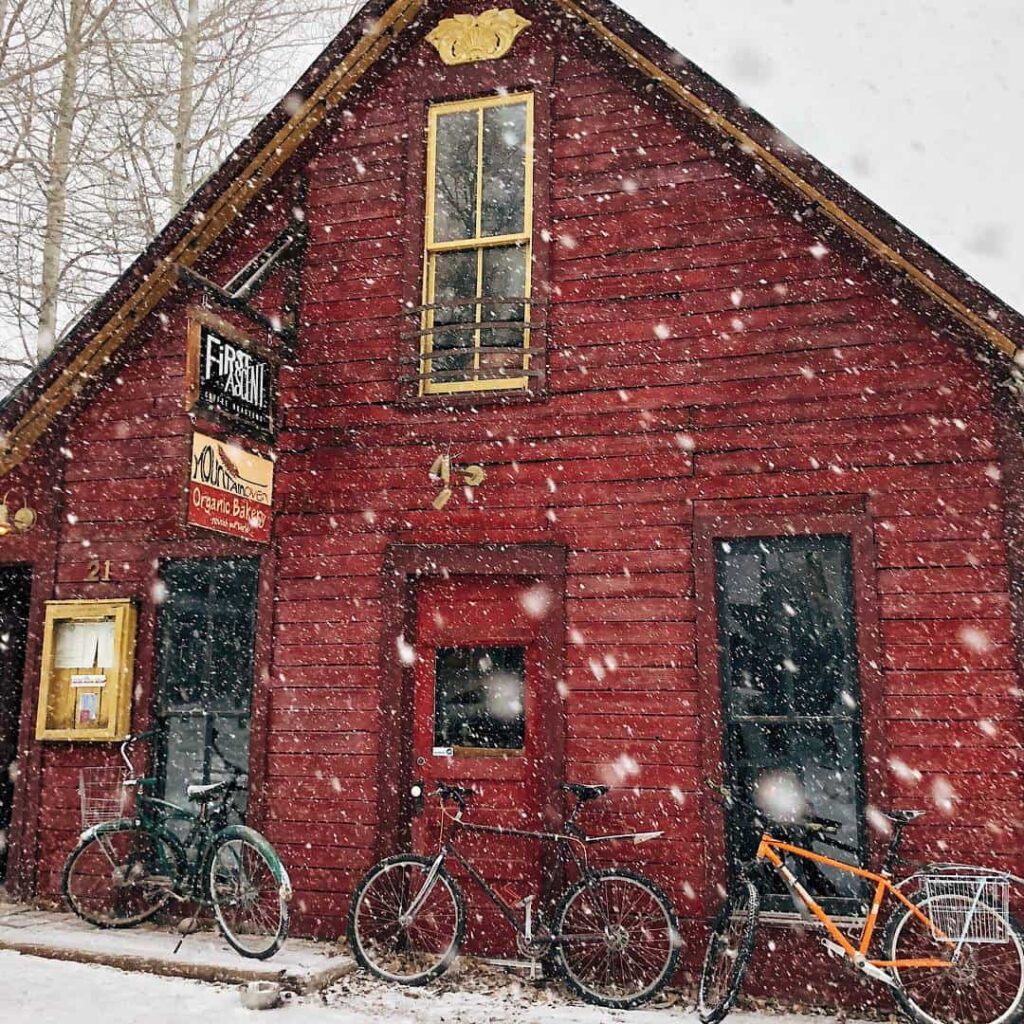
As a climber and a frequent consumer of caffeine, Higby had resorted to consuming caffeine gels in lieu of the market leaders in instant coffee, or utilizing precious cargo space to haul out a french press. The delectable instant coffee seemed almost too good to be true.
At the end of the café’s lease, Mountain Oven made the move to Paonia, and First Ascent rented a warehouse space to continue to traditionally roast coffee beans twice a week for individual consumption, and for local wholesale buyers like the Tea Bar, Coffee Lab, and Mountain Oven.
By this point, the company was focused on expanding their instant coffee business. “Initially we were making it one liter at a time. Then we bought some home freeze dryers, and we were continuing to experiment with brewing and extraction and freeze drying and roasting,” says Higby. Now, Higby has reached the point where the instant coffee is the same as the coffee you would find at First Ascent’s wholesale partners.
And people are starting to take notice—Forbes, Backpacker, and Outside magazine have all written positive reviews of First Ascent’s instant varieties. Higby sees the opportunity for plenty of crossover amongst customers—someone may discover First Ascent’s coffee over at the Tea Bar, and then discover on the website that the company also sells instant coffee which could improve their next backpacking or overnight climbing adventure—plus, it’s as easy as merging a packet of the instant formulation with 8 oz. of hot water.
“We make it really easy—you don’t have to take a scale, you don’t have to take a grinder, you don’t have to deal with wet grounds—you can make a delicious cup of coffee really easily,“ he adds.
Customers might go the other way as well, discovering the instant coffee—perhaps from a glowing outdoor industry trade review, then hopping online to purchase First Ascent’s traditional roasted coffee.
The business’s instant coffee aspect helps address a fundamental market issue. “The roasted coffee world is pretty saturated. The customer acquisition cost of trying to convince someone who doesn’t live here to give up the brand of roasted coffee they are already buying, and order from us [is high], it’s a lot of work,” Higby notes.
Contrast that with the world of instant coffee, which comes with several benefits. First, the product has an indefinite shelf life, and sparse competition outside the historic industry staples—Nescafé and Folgers.
So First Ascent is going all in on ramping up production to meet consumer demand, having worked through a series of production and packaging issues that initially limited capacity for several years.
Because of those issues, First Ascent was frequently sold out of different varieties of the instant coffee, but the team is operating at full steam this year, and recently hired on a full-time production staff member.
“I’ve probably touched every packet of instant coffee we’ve sent out in the last four years,” says Higby, who notes that for now, the roasted coffee portion of the business still supports the instant coffee venture, but he anticipates that will shift soon.
First Ascent is quickly securing new wholesale accounts—largely specialty outdoor retailers—and is aiming to take their instant coffee nationwide, and then international. Higby sees upscale outdoor retailers as a natural point of sale, noting that their customer base probably has exposure to, and likely affinity for, specialty coffee drinks. First Ascent enables them to merge their passions and have a high-quality coffee experience outdoors.
In the search for new outdoor customers, Higby hits the regional festival circuit, giving away over 100 gallons of coffee at the 2022 Ouray Ice Festival. “I made it and served it all myself,” Higby says, before noting that his planner is quickly filling up for the summer of 2022.
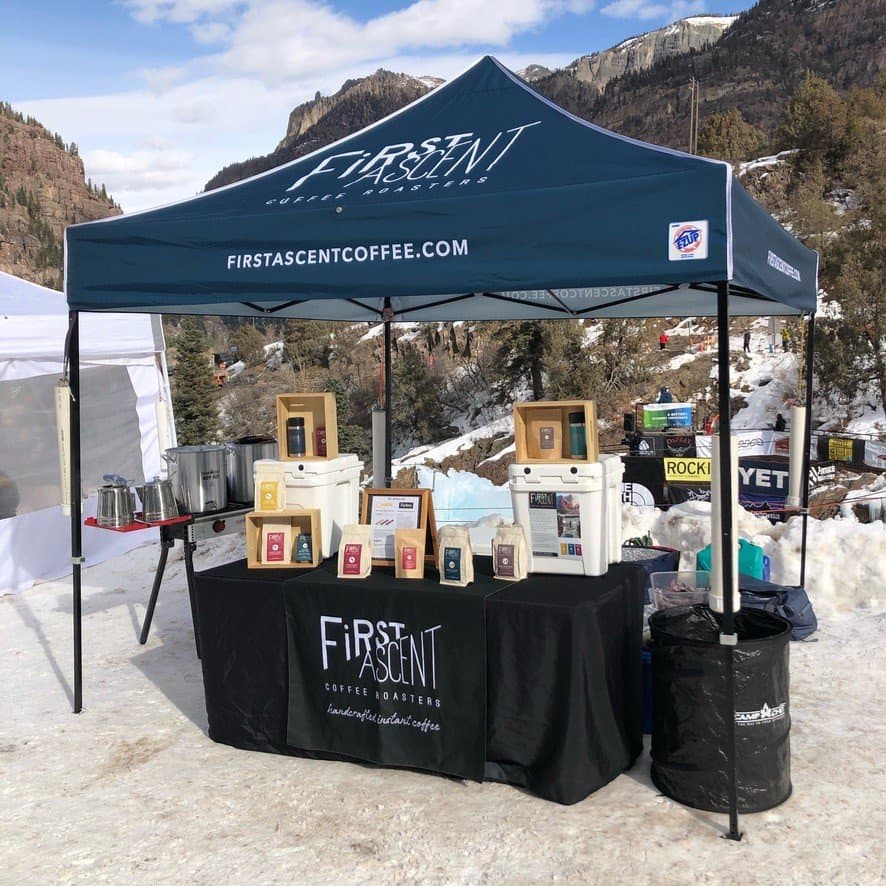
For Higby, First Ascent has transformed his own outdoor coffee routine. “I do car camp a lot. I had the hand grinder, I had the scale, I had the gooseneck kettle, and I don’t bring any of that anymore because our coffee is so good that you don’t need anything—you don’t even need a stove, it dissolves in cold [water]…I’ve done it a few times, and it’s still better than no coffee,” says Higby with a laugh.
A surprisingly large market that Higby has discovered within his own customer base are medical practitioners—doctors, nurses and other hospital staff seeking a convenient boost during their shifts.
“I have one friend who is a doctor and she is on a subscription to our instant coffee. She’s like ‘hospital coffee is terrible, but we have hot water, and I can go put your instant coffee in the cup and pour hot water in it and have a good cup of coffee,’” recalls Higby.
But perhaps the award for the most unique job among First Ascent customers is a bulk customer (he orders four or five boxes per month, Higby says) in Oklahoma who is a farrier—a professional shoer of horses—crisscrossing the state of Oklahoma and utilizing First Ascent’s instant coffee to stay awake behind the wheel.
First Ascent coffee has also made its way overseas to military bases, and has even been purchased by a NASA astronaut who is training for an upcoming trip to the International Space Station. “For a lot of folks it’s just the convenience of a great cup of coffee instantly is really winning them over,” says Higby.
First Ascent stands in stark contrast to other, mass-produced instant coffee brands, which are machine-harvested in bulk (and thus harvest beans that are both underripe and overripe at the same time) and originate from high-yield coffee varieties.
“Most roasters then take that coffee and roast it very dark—the thought process there is to try to overcome or mask those negative tasting notes,” says Higby.
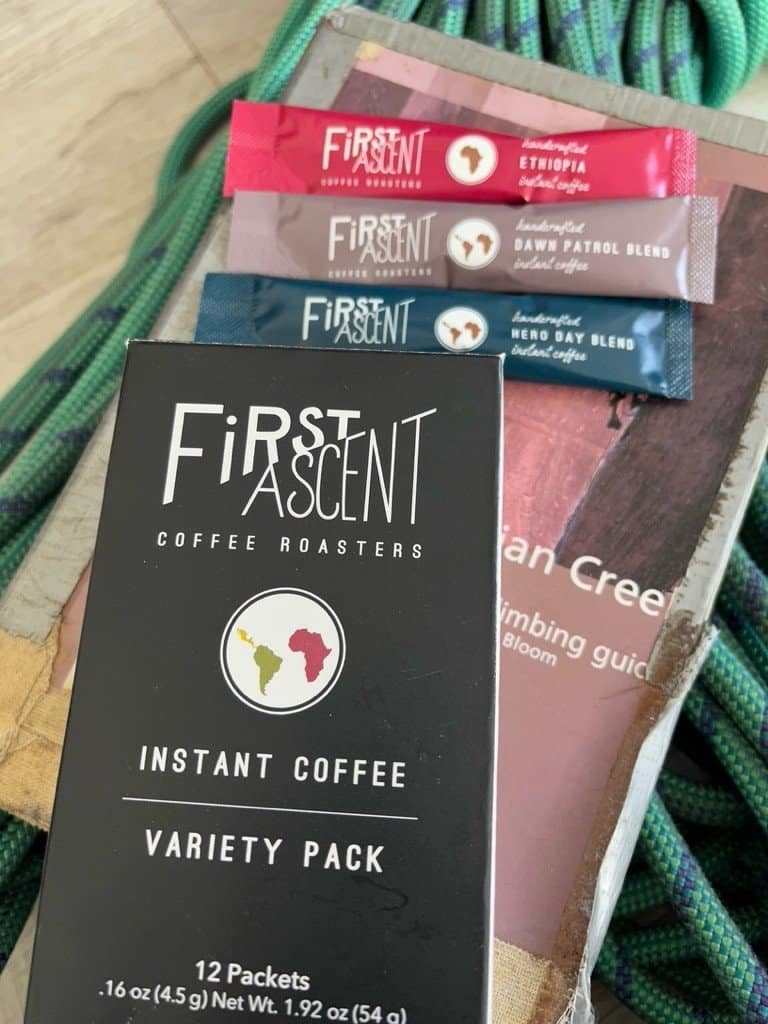
First Ascent coffee, by contrast, is hand-picked and “fresh crop”, and distributed by specialized importers to local roasters in the United States. First Ascent will then roast the coffee to suit the coffee varietal and accentuate the various taste notes specific to its origin.
“All instant coffee is coffee that has been brewed, and then in some way the moisture has been removed out of it. That instant coffee powder is the previously dissolved solids in the coffee…you can’t affect the brewing at that point,” Higby explains of the process.
He adds that many instant coffee brands end up tasting quite bitter, a telltale sign that the coffee has been over extracted. “You’ve left the grounds in contact with the water for too long and you’re starting to extract negative tasting notes,” says Higby, who continues,“You’re getting dark, you’re getting stale, and now you’re getting bitter [flavors].”
Higby adds that First Ascent halts the brewing process for the purpose of preserving flavor, filtering the coffee through paper and placing it into a chiller. In contrast, the strategy of most instant coffee producers is to boil as much moisture out of the coffee as possible before the freeze drying stage, which Higsby suggests introduces additional bitterness.
While the process is important, First Ascent’s sourcing is also critical, and Higby notes that they are careful to select farms and farmers that grow coffee with biodiverse methods. “By and large the growers understand that a biodiverse climate is better for the coffee, it’s better for the land, [and] it also gives them multiple streams of income,” he says.
“We’re also working with importers who are bringing in those good coffees and paying people well and building those positive relationships.”
Higby says that the company’s coffee bean producers are going to great lengths to process coffee in multiple ways, experimenting with different flavor profiles for the end consumers, and also creating hybrid seeds in an effort to create varieties that are resistant to coffee rust. “Coffee rust is a blight that affects huge swaths of coffee trees around the world—it’s tied to climate change and to a lack of biodiversity,” notes Higby.
To make the hybridized coffee, farmers will graft high-producing trees with trees that have demonstrated blight resistance in an effort to create the best of both worlds. “We’re getting these beautiful hybrid coffees that are creating new flavor profiles [and] that are also proving to be resistant to climate change,” says Higby.
While First Ascent is not yet at the production level to deal directly with producers, the company’s team receives updates from the ground by their importers. More recently, First Ascent has forged specific relations with producers in African countries via special regional importers, including from the Democratic Republic of the Congo and Ethiopia.
These relationships allow First Ascent to purchase coffee from women-owned businesses that control the production process and the capital. “In most of these areas, you have women who are doing [the bulk of] the labor,” says Higby, who says the women are now reaping the benefits of their work.
Down the production line, First Ascent was unable to secure any assurances from packaging companies about the duration the coffee would be exposed to air, and so has opted to do their packaging in-house.
That process proved a significant hurdle at first, but is a hiccup that the First Ascent team worked through with time. “Now, I’m going from roast to in the packet in less than a week,” Higby says.
In terms of the varieties First Ascent sells—both for instant and traditional roast coffees—the Hero Day Blend, which Higby describes as a medium roast, is the company’s best seller. It’s also the product most often found at local coffee shops.
The vision behind Hero Day, Higby explains, is that it would bridge the proverbial taste gap between those who were accustomed to more specialty roasted coffees, and those who had only experienced more generic coffee offerings.
First Ascent also offers a suite of single-origin light roasts, which Higby describes as: “lighter, faster, brighter.” Complementing the lighter fare is Dawn Patrol, First Ascent’s iteration of a dark roast. “We wanted something that had more dark chocolate to it—that could hold up to a heavy cream. I think it mixes really well with a protein shake,” says Higby of the blend.
“Again, going back to that idea that different coffees from different parts of the world offer different flavors. Your South American coffees provide body, your Central American coffees tend to be nutty [and] smooth, and then your African coffees often give you those fruit notes.”
Higby notes that with a blend, you can mix-and-match coffees from around the world during different growing seasons to maintain a similar taste profile year-round.
But even as First Ascent grows, one of the biggest hurdles the company faces is convincing consumers to pay more for high-quality instant coffee in a market that has historically been held captive by a handful of big producers.
“There’s been a very static market for it because its [historically] tasted terrible and there’s an expected price point which is reflective of how it tastes…[now] to come along and be like ‘hey you should consider paying the same price for an instant cup of coffee that you pay for a brewed cup of coffee at Tributary [is hard],” says Higby.
As far as the messaging around instant coffee goes, Higby has this to say: “We’re definitely swimming upstream with a sign [going] it’s working, it’s working, trust us!”
